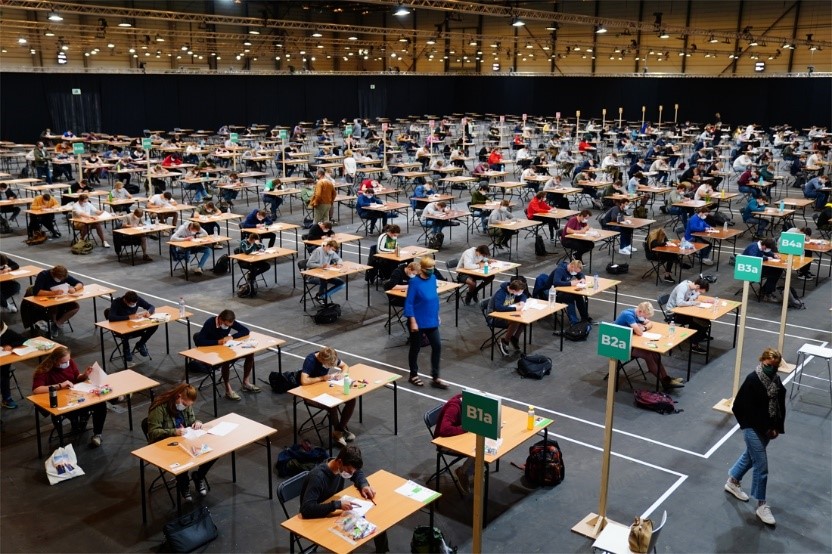
Every year thousands of students graduate from higher education. On the one hand, this leads to a great deal of euphoria. On the other hand, they are faced with many new, additional uncertainties. What now? How do I find my first job? Which type of job do I want to do? How does an application procedure work?
Under normal circumstances, recent graduates already have a lot on their mind, but how do they feel now, in times where an unseen pandemic makes everyone feel insecure? What influence does the corona crisis have on the mental well-being of these graduates and on their opportunities on the labor market?
What does the future look like? 
According to Prof. Dr. Stijn Baert, labour economist at the University of Ghent and the University of Antwerp, the labour market directly follows the trends in the economy. The health of our economy in turn follows the course of this crisis. Predictions about the future of the labor market, therefore, depend on a number of factors. Prof. Dr. Baert explains that two steps have to be taken: “First we have to get the health crisis under control and afterwards we can look at the economic consequences. Depending on these consequences, we can make predictions about the future of the labor market”.
At the start of the corona crisis, there was a severe drop in the number of new vacancies on the job marketplace. This is expected to remain the case for several more months. The levels reached during last year will not be seen for a long time yet. This is accompanied by a shift in dominant position. Job seekers can make fewer demands on employers, who in turn are given more choices. It remains to be seen whether new graduates will have fewer or more opportunities as a result. At first you would think that employers in this situation would recruit more experienced people who are currently unemployed. However, recent college or university graduates can be a breath of fresh air and they cost the employer much less.
Fear of the future goes hand-in-hand with a broader job search.
A study by Prof. Dr. Stijn Baert, in collaboration with Accent and NOWJOBS, found that 71% of recent graduates fear it will be more difficult for them to find a first job than their predecessors did.
This has some striking consequences. For example, it is seen that recent graduates start looking for a job more quickly during this crisis, fearing that the search will take longer than in normal times. They are also less picky than their predecessors when it comes to choosing a job. 50% of the respondents who look for a job indicate that in their search they will apply for jobs that do not immediately match their field of study or that they would otherwise not consider. Furthermore, 40% of the students who will enter the labor market assume that they would have already found a job if it wasn’t for Corona.
Amandis spoke with Arthur Cornelis (Bachelor Industrial Product Design at Howest Kortrijk - graduated January 2020)
During his studies Arthur was, in his own words, quite a dreamer who was not yet concerned with life after college. “I had the feeling that it would all work out. Now that I have graduated and have been confronted with the facts, I am forced to be more realistic about my future. Recently I had to make decisions about which direction I want to start my career in a very short timeframe”.

Arthur started applying for jobs in April and, until now, without success. According to him, this is due significantly to the Corona crisis. Many interesting opportunities have been put on hold or have even disappeared from websites, which is why Arthur has currently broadened his search. The findings from the research of Prof. Dr. Baert return in the interview with Arthur. He also thinks he would have had more opportunities outside of the Corona crisis and that he must now adjust his expectations. He is confident that he will find a good job, but does not know whether it will be a job in an area that is an extension of his education.
"I often get the comment: "It may not be easy now, with Corona. However, I started looking for work when the Corona crisis was in full swing, so I don't know any other environment”.
Arthur remains positive. He believes that companies will be creative enough to open new opportunities for young graduates. He expects that vacancies that have been put on hold will be opened again and that new vacancies will be added when the economy stabilizes. "I will also have to adapt, be creative and broaden my field of interest to promote my search for a job", Arthur says.
Arthur also thinks the job search may be extra difficult for graduates as companies are more likely to look for experience than theoretical knowledge. For example, juniors with a few years of work experience who recently find themselves without a job, could be seen as a more attractive proposition to employers than recent graduates, who cannot immediately offer the same immediate added-value to the employer.
A few more tips from Amandis for newcomers to the labor market:
- Create an up-to-date LinkedIn profile.
A clear and complete profile on LinkedIn can work wonders when looking for a job. Make sure your studies and / or work experience are clearly described. Use keywords to highlight your experience and click the tab ‘Open to work’. That way, recruiters will find your profile much faster when they have a vacancy that matches your profile.
- A recent CV.
An original resume can stand out, but be careful. A movieclip or treasure map as a CV can, if not created with care, may receive negative a reception. Make sure that your CV is concise, as this will bring essential competencies into focus. It should, of course, not be too short either, as it must contain enough information to make your application stand-out. Relevant experience such as an internship or foreign Erasmus experience are things that should definitely be included.
- Be prepared for job interviews.
Do your research on the organization you are visiting and the position you are applying for, so that you know what to expect. How big is the organization? What is their market? What are the names of the people I will be talking to? What competencies does someone need for this position? In addition, you can also practice in advance how you will introduce yourself and how you will present yourself. After all, every job interview is also a moment to bring out the Sales person in you. You have to be able to convince the employer why they should choose you, and not one of the other fifty applicants.
- First impressions say a lot.
The first impression you have on someone is critical. During the first few seconds that the recruiter sees you, they will begin to formulate an opinion of you. During those moments, prejudices may arise, either explicitly or implicitly, so make sure you are dressed according to the style of the organization and be confident in your attitude and communication.
- Mimicry and gestures.
Mimicry and gestures during a job interview can be as important as what you have to say. Make sure that you appear confident and credible during the interview. Don't sit at the table like you sit at home on the couch. Sit upright, with your hands above the table and use body language to clarify things that you are telling.
- Stay yourself.
As I already mentioned, presenting yourself correctly is an important aspect of applying. However, you should not pretend to be anything other than yourself. After all, once you get a job, you will also have to live up to what you said during the job interview in the workplace.
https://www.vdab.be/magezine/07-2020/expert-stijn





